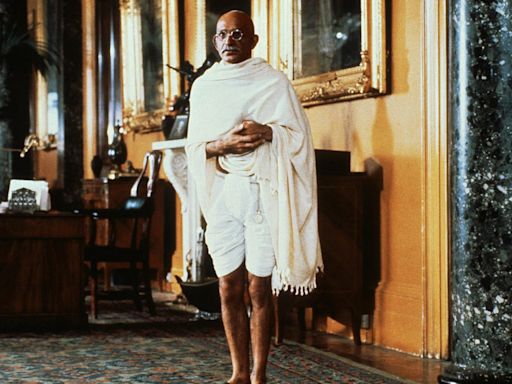Ad
related to: richard attenborough documentariesStream Stories From All Eras, Including Classics and New Releases At Great Prices. Get Deals and Low Prices On Top Products At Amazon
Search results
What to watch
Series of short documentaries in which Sir David Attenborough visits London, the Scotland Highlands, Fair Isle, New Forest, and other places in the UK. Episode list: "Mountains and Moorland"; "Island Home"; [22] "Concrete Desert"; "The Fens"; "The Highway"; "Granite Cliffs"; "Green Forests"; "The Open Fields".
Jan 19, 2024 · Best David Attenborough documentaries. Photograph: BBC. 1. Planet Earth II (2016) It was a battle to the death for the top spot between all the Planet Earths, Blue Planets and Life trilogy.
- Helen O’Hara
May 15, 2024 · 1. 26 VOTES. Life on Earth. Photo: BBC One. Date Released: 1979. What’s Documented? Life on Earth: A Natural History by David Attenborough was Attenborough's first major documentary series and what would become the foundation of his prolific career.
- Patrick Thornton
- The Independent via Yahoo
Nobody knew Gandhi before Richard Attenborough movie, says Indian prime minister Modi
Nobody knew Gandhi before Richard Attenborough’s 1982 film- documentary, Indian prime minister Narendra Modi has claimed. In an interview with local media on Wednesday (29 May), Modi blamed ...
13 hours ago
- The Telegraph via Yahoo
Nobody knew Gandhi before Oscar-winning biopic, says Narendra Modi
In an interview with local media, Narendra Modi blamed the Congress-led governments of the 20th century for failing to promote the national hero. “Nobody...
1 day ago
People also ask
Which documentaries with David Attenborough make you think about our planet?
What is David Attenborough best known for?
Which BBC series is David Attenborough in?
Why should you watch Sir David Attenborough's natural history documentaries?
- Overview
- 1. Planet Earth I & II
- 2. Blue Planet I & II
- 3. Frozen Planet I & II
- 4. David Attenborough: A Life on Our Planet
- 5. Seven Worlds, One Planet
- 6. Dynasties I & II
From celebrating the natural world to outlining the effects of human-caused climate change, Sir David Attenborough's documentaries delve into the complexity of natural ecosystems, marvel at our planet and remind us how fragile the changing world is.
Sir David Attenborough has produced numerous natural history documentaries in his career.
This article was produced by National Geographic Traveller (UK).
For more than 70 years, Sir David Attenborough has been the face and voice of countless wildlife documentaries, and has continued to bring the vast scale and diversity of the natural world to our screens.
Attenborough’s latest series, Planet Earth III, once again zooms in on the ever-changing habitats of our world. The programme documented more than 43 countries over the course of nearly five years — from deserts and grasslands to the Arctic extremes on the knife edge of the planet — to film the wonders of the natural world.
Focusing on wildlife, such as chacma baboons in the Tsaobis Nature Park in Namibia, and southern right whales off the coast of Argentina, Attenborough explains how an increasing number of species are vulnerable to habitat loss and extinction due to human actions. Plus, for the first time ever, humans took centre stage in the final episode of the series, which shared stories of inspiring individuals fighting to save and preserve our wildlife.
First broadcast in 2006, Planet Earth showcases the untouched regions of the planet and the last true wildernesses. On a journey around the world, from pole to pole, the series draws attention to the effects of climate change.
The programme returned 10 years later, detailing how the planet has changed, and the extent that animals must go to in order to survive. Both series cover a vast range of habitats around the world, from mountains and deserts to jungles and oceans. Each episode unveils a cornucopia of life, displaying the complex relationships between all species that are essential to their mutual survival, and showcases all aspects of life, including mating, hunting, birth and death.
Each episode also features a Planet Earth Diaries — a behind-the-scenes look at the difficulties and processes involved with filming elusive and unpredictable plant and animal behaviour, giving a fascinating insight into documentary-making for aspiring wildlife videographers.
Watch Planet Earth and Planet Earth II here.
Billed as ‘the first-ever comprehensive series on the natural history of the world’s oceans,’ Attenborough’s 2001 and 2017 Blue Planet instalments provide a never-before-seen insight into marine life. Several species, including Dumbo octopus and hairy anglerfish, had never been captured on camera before.
Ranging from familiar shallow waters to the depths of unexplored oceans, each 50-minute episode focuses on a different aspect of life in vast and ever-changing marine environments. Seasonal seas and coral reefs provide the conditions for epic dramas as each species competes for food and space, needing to constantly adapt to survive.
The second series revisits the vast span of Earth’s seas and oceans to draw attention to the dangers and risks of human activity on marine life. Attenborough examines the role of anthropogenic activity in the last episode, ‘Our Blue Planet’, and urges us to act now to save our oceans. The whole series highlights the effects of plastic and chemical pollution on marine ecosystems and showcases the diversity of marine life that we stand to lose as a result.
Watch Blue Planet and Blue Planet II here.
The two Frozen Planet series, broadcast in 2011 and 2022, focus on the extreme climates of the North and South Poles, and study how native species have adapted to survive in this hostile and unforgiving environment. Following the polar seasons, each episode shows a glimpse of life in the most remote places on Earth. The programme highlights how animals face a number of threats and potential dangers, looking at the ways in which they survive long, dark winters and the challenges of raising offspring.
More than 10 years later, Attenborough returned to once again urge us to act now to protect our frozen regions. The second instalment broadens the scope to include all the planet’s frozen habitats, featuring national parks in Russia, Kenya and New Zealand, mountains in Italy, Japan and Chile, and coastlines of Canada and Greenland.
A Life on Our Planet is Attenborough’s witness statement to the current state of the Earth due to human-caused climate change, outlining how the Amazon rainforest could disappear, how rising sea levels could destroy habitats and homes, and how soil degradation could cause food instability across the world.
In the hour-and-a-half-long 2020 film, Attenborough shares an overview of his life, his concerns for the world and his hopes for the future. Through footage of his career and key moments of interaction with animals, he looks at how the planet has changed over his lifetime.
The film also delivers messages of hope, finding effective solutions to restore the planet’s biodiversity. Accompanied by footage of enduring natural life, Attenborough marvels at the wonders of our planet, and reminds us that it isn’t too late to preserve it.
Watch A Life on Our Planet here.
Seven Worlds, One Planet offers an in-depth look at the diverse climates of our planet, taking viewers to the cold and hostile expanses of Antarctica, where penguins, sea birds and seals thrive, to Asia — one of the most varied and extreme continents on the planet. The seven hour-long episodes are each dedicated to one continent and showcase the rich variety of marine and land life in each region. The series was filmed across 41 countries.
The series from 2019 covers the Amazon rainforest and the volcanoes of the Andes in South America, extreme seasonal changes in North America and the diversity of African wildlife, as well as the unique species of Australia. It also looks at the animals that remain in the pockets of wilderness in Europe, the planet’s most crowded continent.
Dynasties is a five-part series released in 2018 about vulnerable or endangered species: chimpanzees, emperor penguins, lions, painted wolves and tigers. Each episode follows the lives and stories of some of the last surviving families of these species.
A combination of human activity in these habitats and natural competition between animals threatens to wipe out these families completely, and the programme sheds a light on the battles they’re engaged in to produce and raise offspring that will continue their line.
Dynasties returned in 2022 for a second season, this time focusing on families of puma, elephants, cheetahs and hyena as they struggle to survive, fighting against rivals and natural cycles of life and death to preserve their bloodlines.
Watch Dynasties I and Dynasties II here.
Series overview. Season 1 (2019) Season 2 - Our Planet II (2023) Specials. Reception. Controversy. Soundtrack. Broadcast. See also. References. External links. Our Planet is a British nature documentary series made for Netflix.
In 2020, Attenborough narrated the documentary film David Attenborough: A Life on Our Planet. The film acts as Attenborough's witness statement, reflecting on his career as a naturalist and his hopes for the future. It was released on Netflix on 4 October 2020.
A nature documentary series written and presented by David Attenborough, that looks at the evolution and habits of amphibians and reptiles. 19. A Perfect Planet. Perfect Planet analyzes, in five episodes, how the forces of nature, including the power of the Sun or even humans, drive and shape life on Earth.













